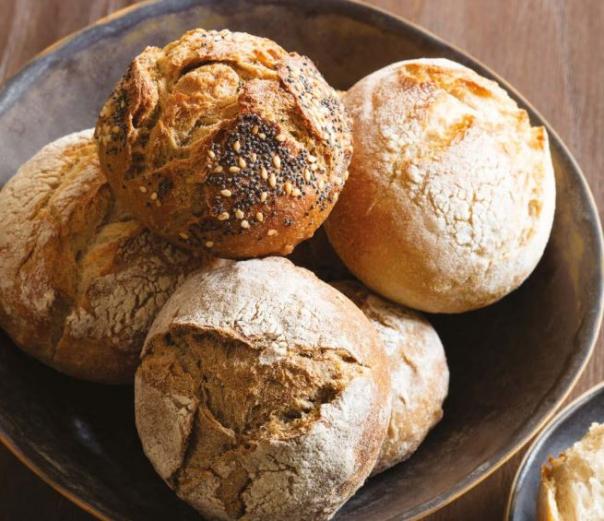
The news comes from bread brand Burgen, who was commissioned by the World Health Organisation, to gain a deeper understanding of British consumers’ outlook on healthy eating.
Key findings include:
- 34% think they need to avoid bread to maintain a healthy weight
- Nearly a quarter are ‘clueless’ on carbs and have “no idea” whether they are good or bad for us
- 49% don’t believe breakfast is the most important meal of the day
- 21% think long periods of exercise are better than short bursts, with a further 20% avoiding food before working out
- 13% don’t snack after 6pm, as they think it can result in weight gain
To debunk 12 of today’s ‘most popular’ health myths, Burgen teamed up with nutritionist Rhiannon Lambert to offer the below advice.
1. Is breakfast the most important meal of the day?
Breakfast helps top up the energy stores you have used up each night whilst your body repairs and renews itself. It also gives you energy for your morning activities, whether at work, school, home or just out and about.
While breakfast is often quoted as ‘the most important meal of the day’, this may not be strictly true.
Research has shown that people who eat breakfast have more balanced diets than those who skip it, are less likely to be overweight, lose weight more successfully if overweight, and have reduced risk of certain diseases such as cardiovascular disease and diabetes.
2. An hour’s exercise is better for you than 15 minutes
To stay healthy, adults should try to be active every day and aim to achieve at least 150 minutes of physical activity over a week through a variety of activities.
3. Is cutting carbs the ONLY way that you can maintain a healthy weight?
The view that all carbohydrates should be cut from someone’s diet to maintain a healthy weight is quite simply wrong. We get the energy in our diet from foods containing; carbohydrates, protein and fat.
Carbs are an important source of fuel for your brain and body. Good (complex/starchy) carbs include wholegrain pasta, quinoa, brown rice, sweet potatoes, wholegrain bread, oats and bulgur.
4. You shouldn’t eat after 6pm
The danger here is, post-6pm becomes a window of opportunity to hoover up a myriad of foods high in calories, saturated fat and packed with added salt and sugar, undoing your earlier healthier choices.
5. You should NOT eat before your workout
No matter what your sport, carbohydrates are vital for the best performance. Exercising muscles rely on carbohydrate as their main source of fuel. The amount you need will depend on your training programme and dietary goals.
The ideal time for a pre-exercise meal is 2 – 4 hours before your workout because its early enough to digest the food, yet late enough that this energy won’t be used up by the time you begin exercising.
6. Bread is bad for you
Bread, especially wholemeal, brown and seeded bread, is a healthy choice to eat as part of a balanced diet. It is a nutritious and economical food and provides an excellent source of many nutrients including: fibre, calcium, iron and vitamin B.
7. Whole Grains
Eating whole grains regularly as part of a healthy diet and lifestyle helps keep us healthy and may reduce the risk of many common diseases.
Intake of whole grains in the UK is very low. Surveys show that 95% of adults don’t eat enough whole grains and nearly one in three of us get none at all so consuming wholegrain bread as part of a healthy, balanced diet should be encouraged.
8. Bread makes us bloat
There are many factors that can contribute to bloating, largely related to lifestyle. For example, stress, lack of sleep, sitting down for several hours (moving encourages blood flow to the digestive tract), high waisted clothing, etc. Eating mindfully is also important.
9. You can only eat carbs after a workout
The best way to fuel exercise is to have a regular meal/eating pattern which includes a low fat, high-carbohydrate snack or a light meal two to three hours before exercise. Then after exercise start replenishing your glycogen stores immediately with a high carbohydrate low fat snack.
10. Carbs make you sleep poorly
Our blood sugar is affected by the amount of carbohydrate we eat. If our blood sugar levels are changeable this can result in headaches, poor concentration or feeling moody and irritable.
If you don’t eat enough carbohydrate and provide your brain with glucose you may find thinking clearly and logically can become very difficult. You may also feel very tired and in a low mood.
If your brain isn’t getting enough fuel it will keep waking you up to find food. This makes sleeping difficult. If you don’t sleep well, altering your dietary intake may make a significant difference.
11. Freezing bread reduces its nutritional value
You can freeze pretty much everything, including bread. Wrap it tightly in freezer bags or similar before placing in the freezer otherwise, the cold air will dry it out. Research suggests there is no significant impact on nutritional value when freezing.
12. Gluten-free bread is better for you than non-gluten free bread
Gluten-free bread is essential if you have been diagnosed with coeliac disease, but if you have not been diagnosed then removing gluten from your diet means you run the risk of missing out on fibre and some valuable vitamins and minerals